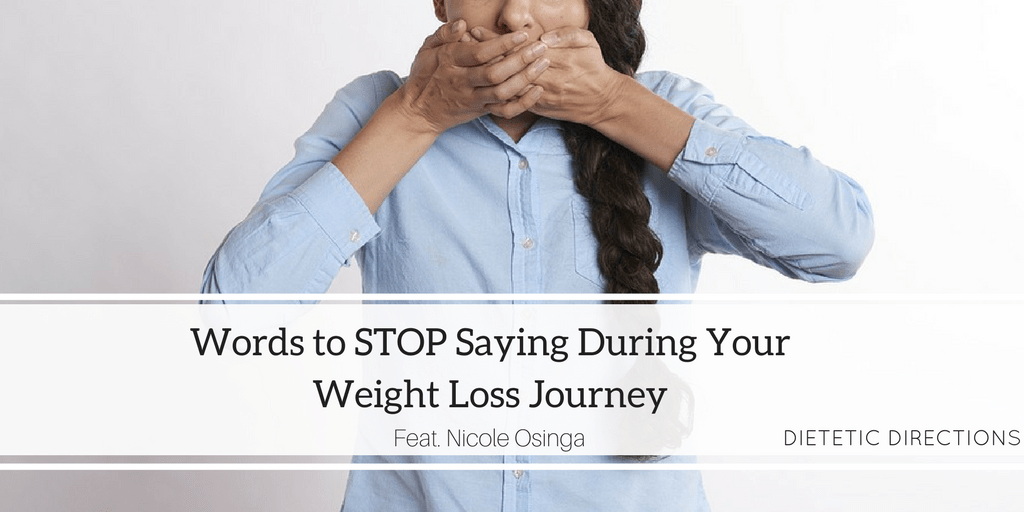
Words to STOP Saying During Weight Loss Journey
Our words are extremely powerful. They shape our perception/reality and reflect our innermost thoughts and feelings. When I saw this article, What to Stop Saying During your Weight Loss Journey by fellow Registered Dietitian, Nicole Osinga, I had to bring her onto Dietetic Directions to guest blog (again). Nicole is a private practice and media Dietitian, based in Durham region. If you are not following Nicole on Instagram, you need to; her pictures are gorgeous and content is outstanding.
Keep up the great work Nicole and thanks for helping us be mindful of our language while on our eating well journey.
Words are powerful! What to not say during #WeightLoss journey feat. @nicoleosinga_rd Click To TweetI work with many clients who have goals of losing weight. I hear certain phrases often, which can be counter-productive and harmful in reaching weight loss goals – let me explain why:
1.“I’m having a Cheat Day/Meal”
If it’s a ‘cheat meal’ you are implying that you are missing something in your diet. Ask yourself – do you feel like your diet is too strict? If you need a mental break or a ‘cheat’ from your diet, it just might be. To be clear, the actual meal is not the problem. It is the mentality that goes with it. Thinking “I will go back to my normal eating pattern tomorrow so now’s the chance to eat everything that I’ve been missing!” This leads to a deprivation-binge eating cycle. You feel guilt after that binge, which leads to periods of restriction to make up for that binge. We’ve been taught since we were little that cheating is bad, so let’s get away from that language. This language brings a whole bout of negative emotions and sense of failure.
What to say instead:
“I choose to eat healthy foods most of the time because they make my body feel good. Occasionally I choose to eat less-healthy foods, and I enjoy them to the fullest. I eat less-healthy choices guilt free, because I make room in my eating pattern for them.”
The key here is to make the less-healthy choice a conscious, expected choice. This keeps your food choices within your control.
2.“I Have No Willpower”
Many people blame faulty willpower for their imperfect choices. However, lack of willpower isn’t the only reason you might fail to reach your goals. Willpower is the ability to resist short-term gratification in pursuit of long-term goals or objectives. Willpower can be compared to a muscle that becomes fatigued with overuse. Studies show that repeatedly resisting temptation drains your ability to withstand future enticements.
What to say instead:
“Are my goals realistic and achievable? Am I trying to tackle too many at once?”
Being depleted in one area can reduce willpower in other spheres, it is more effective to focus on a single goal at a time rather than attacking a list of multiple resolutions at once .
Willpower is only part of the equation for making a change, so it is not best to rely on willpower alone. Make sure you start with small, realistic goals that you can build on.
3.“I Turn to [Chocolate] When I’m Upset/Stressed/Angry etc.”
Food is emotional and we associate a lot of things with food. For example, a comforting memory, relaxation, stress relief, etc. It’s important to realize what we associate food with. How many times have you turned on a movie and automatically reached for chips? Those chips are associated with watching that movie, which in turn means relaxing.
What to say instead: “What kind of hunger am I experiencing?”
I talk to my clients a lot about mouth, heart and stomach hunger:
- Mouth hunger is wanting the physical pleasure of food.
- Heart hunger is eating in response to emotion.
- Stomach hunger is true hunger. Mouth and heart hunger occur without stomach hunger.
Try to identify what kind of hunger you are experiencing at various (sometimes stressful) moments. This awareness will lead to changing your eating behaviour. You will realize when you are eating in response to different emotions and will find alternative strategies to deal with those emotions, instead of using food to fill a void.
Turning to #chocolate when upset? Find out how language impacts your emotional eating feat. @NicoleOsinga_rd on Dietetic Directions. Click To Tweet4. “I’m Avoiding Carbs”
I hear this usually around carb-dense foods – “I’m avoiding bread” or “I’m avoiding pasta”. While decreasing carbs in your diet is a good tactic for losing weight, if we focus on eliminating something completely from our diets, we’re going to want it more! It’s the forbidden fruit – something that we find desirable, that is off-limits. Read more here why we need carbohydrates in our diet.
Andrea’s sheet pan dinner recipe
What to say instead:
“I’m focusing on adding __ to my meal” (for example vegetables, fibre or protein). By virtue of focusing on what you’re adding to your meal, you will be leaving out something (let’s say extra bread for example). Consider this: “I’m focusing on adding protein to my breakfast”.
Your breakfast all of a sudden transforms from muffins to Greek yogurt and fruit…and you’re not even focusing on what you’ve eliminated! The difference is the frame of mind – by thinking about what you can add, you avoid feeling restricted and deprived.
Now, your turn!
Do you hear yourself or others saying these phrases? How do you feel when you say them? What do you think you can say instead? Let me know!











